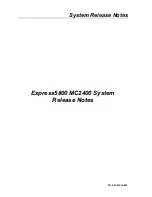
EDS1100/2100 Device Server User Guide
86
11: Security Settings
The EDS1100/2100 unit supports Secure Shell (SSH) and Secure Sockets Layer (SSL). SSH is a
network protocol for securely accessing a remote device. SSH provides a secure, encrypted
communication channel between two hosts over a network. It provides authentication and
message integrity services.
Secure Sockets Layer (SSL) is a protocol that manages data transmission security over the
Internet. It uses digital certificates for authentication and cryptography against eavesdropping and
tampering. It provides encryption and message integrity services. SSL is widely used for secure
communication to a web server. SSL uses certificates and private keys.
Note:
The EDS1100/2100 device server supports SSLv3 and its successors, TLS1.0
and TLS1.1. An incoming SSLv2 connection attempt is answered with an SSLv3
response. If the initiator also supports SSLv3, SSLv3 handles the rest of the connection.
This chapter contains the following sections:
SSL Certificates and Private Keys
SSH Settings
SSH is a network protocol for securely accessing a remote device over an encrypted channel. This
protocol manages the security of internet data transmission between two hosts over a network by
providing encryption, authentication, and message integrity services.
Two instances require configuration: when the EDS1100/2100 unit is the SSH server and when it
is an SSH client. The SSH server is used by the CLI (Command Mode) and for tunneling in Accept
Mode. The SSH client is for tunneling in Connect Mode.
To configure the EDS1100/2100 device server as an SSH server, there are two
requirements:
Defined Host Keys:
both private and public keys are required. These keys are used for the
Diffie-Hellman key exchange (used for the underlying encryption protocol).
Defined Users:
these users are permitted to connect to the EDS1100/2100 SSH server.
This page has four links at the top for viewing and changing SSH server host keys, SSH server
authorized keys, SSH client known hosts, and SSH client users.
















































